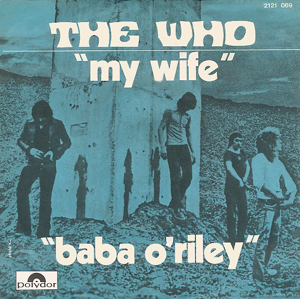- Baba O'Riley
Infobox Single
Name = Baba O'Riley

Artist =The Who
from Album =Who's Next
B-side = "My Wife"
Released = November 1971
Format = 45
Recorded = May 1971 atOlympic Studios inLondon, England
Genre = Rock
Length = 5:05
Label = Decca (US) Polydor (UK)
Writer =Pete Townshend
Producer =The Who Glyn Johns
Misc = Extra tracklisting
Album =Who's Next
Type = Studio
prev_track =
prev_no =
this_track = "Baba O'Riley"
track_no = 1
next_track = "Bargain"
next_no = 2"Baba O'Riley" is a song by the English rock band
The Who , written byPete Townshend .Roger Daltrey sings most of the song, with Pete Townshend singing the middle eight: "Don't cry/don't raise your eye/it's only teenage wasteland". The title of the song is derived from this combination of the song's philosophical and musical influences:Meher Baba andTerry Riley . [cite album-notes
title = The Who: The Ultimate Collection
albumlink = The Ultimate_Collection (The_Who_album)
bandname = The Who
year = 2002
notestitle =
url =
first =
last =
pages = 12
format =
publisher = MCA Records
publisherid=
location =
mbid = ]History
Townshend originally wrote "Baba O'Riley" for his "Lifehouse" project, a
rock opera that was to be the follow-up to The Who's 1969 opera, "Tommy". Townshend derived the song from an experimental recording of his Lowrey Berkshire home organ, which the band reconstructed. "Baba O'Riley" was going to be used in the "Lifehouse" project as a song sung by Ray, the Scottish farmer at the beginning of the album as he gathers his wife Sally and his two children to begin their exodus to London. When "Lifehouse" was scrapped, many of the songs were released on The Who's 1971 album "Who's Next ". "Baba O'Riley" became the first track on "Who's Next". The song was released as a single in several European countries, but in the United States and the United Kingdom was only released as part of the album.Drummer
Keith Moon had the idea of inserting aviolin solo at the coda of the song, during which the style of the song shifts from crashing rock to an Irish folk-style beat.Dave Arbus , of East of Eden, plays the violin in one of the most recognizable solos in popular music. In concert, lead singerRoger Daltrey replaces the violin solo with aharmonica solo. The Who have produced a live version of the song with a violin, provided byNigel Kennedy , during their 27 November 2000 concert at theRoyal Albert Hall .Noted for its innovative fusion of the Who's
hard rock sound and early electronic music experimentation by Townshend inspired by minimalist composerTerry Riley , and for its crashing chorus coupled with repeating F-C-Bbpower chords , the song has been a perennial favorite onclassic rock radio station s as well as a concert staple for the band.The song's iconic backing track was derived from deep within the "Lifehouse" concept. Townshend wanted to input the life information of
Meher Baba into a synthesizer, which would then generate music based on that information. That music would have been the backing track for "Baba O'Riley," but in the end, the frenetic sequence was played by Townshend on a Lowrey Berkshire Deluxe TBO-1 organ using its marimba repeat feature. [http://www.thewho.net/whotabs/equip-baba.htm Pete's Equipment, Lowrey Berkshire Deluxe TBO-1]Although they never actually did it in concert, The Who considered pulling a person from the audience and programming their vital statistics into a synthesizer that would, in effect, translate that person into a musical theme around which a song could be built (an idea recently resurrected as the
Lifehouse Method )."Teenage Wasteland"
"Baba O'Riley" has often been mistakenly called "Teenage Wasteland" after the phrase repeated throughout the song's chorus. "Teenage Wasteland" was in fact a working title for the song in its early incarnations as part of the "Lifehouse" project, but eventually became the title for a different but related song by Townshend, which is slower and features more lyrics. A version of "Teenage Wasteland" is featured on "
The Lifehouse Chronicles ", a six disc set of music related to the "Lifehouse" project, and on several Townshend compilations and videos.Accolades
* "Baba O'Riley" appears at #340 on the list of
Rolling Stone's 500 Greatest Songs of All Time .
* It is in the Rock and Roll Hall of Fame for being one of the500 Songs That Shaped Rock and Roll . [cite web |url=http://www.rockhall.com/exhibithighlights/500-songs-by-name-ac/ |title=500 Songs That Shaped Rock and Roll |format=HTML |accessdate=2008-07-09]Use in sport and media
* It is included in the music
video game "Rock Band " as a downloadable song.
* It plays in the ending scene of "The Girl Next Door", a 2004 film starringEmile Hirsch andElisha Cuthbert .
* It is played during the introduction of theLos Angeles Lakers starting line-up.
* It is used as the openingtheme song for the proceduralcrime drama "".
* It is featured in a critical scene of the "House" season 1 episode "Control".
* It is used in the 1999 film "Summer of Sam ".
* It is used in the first episodes of both the UK and US versions of the television series "Life on Mars". The US episode takes its title, "Out Here In The Fields", from the first line of the song.Used in a montage on an episode of My Name is EarlRecorded covers and references
*
Dropkick Murphys covered this song as a bonus track in their album "The Meanest of Times ".
*Big Audio Dynamite II sampled the background track for their own song, "Rush".
*Indie rock bandArchitecture In Helsinki use the riff from Baba O'Riley in the song "Maybe You Can Owe Me " from the album "In Case We Die ".References
Wikimedia Foundation. 2010.
